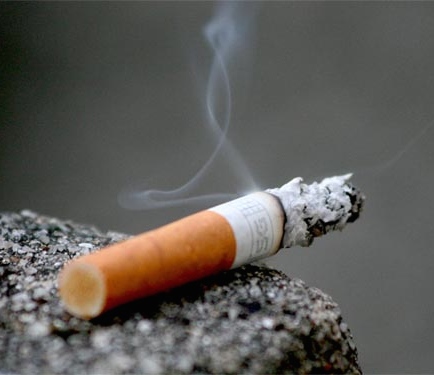When you pull together memories into a cohesive piece, like a book, some of your favorites won’t fit. One of these for me is about how, after the death of my first spiritual teacher—whom I refer to in the book as the swami—I went back home to Honolulu, got a job with a small local publisher, and took up smoking again. When my book finally comes out, this anecdote will not be in it. So, I’ll share it here.
Several years ago, I met a shaman. He looked quite conventional, with short brown hair and glasses, and when he spoke with the gods—with the ancestors, I guess he would say—he smoked a cigar. He said tobacco is a holy substance. If it’s used correctly, which means if it’s used in rituals to communicate with the higher realms, tobacco is beneficial to the individuals smoking it. And if used incorrectly, like any other holy substance that’s abused, tobacco will destroy you.
I’d had a long relationship with tobacco. Cigarettes had flavored my life between the ages of twelve and twenty-five. In my middle teens it seemed that I lived to smoke. It’s what my friends and I did: we smoked.
My friend Terry and I would ride our bikes a mile or two down the freeway access road to a drainage pipe, where we would sit and smoke. I remember one Saturday afternoon when we lit one cigarette after another, and watched the flat, unrelieved and unromantic Oklahoma horizon. Whatever else my life would be, I thought, it had to be more interesting than this. And Terry and I wouldn’t have gone out riding our bikes at all if it hadn’t been for cigarettes.
When I went to college, cigarettes were part of studying, going out, having coffee, drinking beer; something to do with my hands when I didn’t know what to say. Cigarettes made me feel sophisticated.
When I went to work as a newspaper reporter, cigarettes showed the world I was a professional, I was tough, I knew what I was doing and could handle myself well under pressure. There I would be, on a deadline, taking the time to light one more cigarette.
The U.S. Surgeon General’s report came out at some point in my early twenties, and those of us who had been fooling ourselves that smoking was a harmless accessory to our lives got to contemplate the specter of lung cancer and emphysema. I didn’t quit immediately, but I began to wonder how I might.
Sometime in my twenty-fifth year I caught the flu. It was one of those bad bugs that make it impossible to do anything but lie in bed. For three days, I didn’t feel like smoking. By the time I got up, I was through the worst of any withdrawal. What withdrawal? I hadn’t even noticed it. I figured I might as well quit.
It was a year before I picked up a cigarette. I hadn’t started smoking again, you understand. It was just one cigarette, now and then, when I really felt like it. One night after dinner with some friends, I lit a cigarette and told them how easy it had been for me to quit. They laughed; I did too, but I saw it wasn’t funny.
So, I quit smoking again, and this time it was like giving up a serious drug, which nicotine is. This time I missed cigarettes. I missed everything about them: the solid feel of a new pack, the flash of the lighter, the husky aroma of burning tobacco, the heady feeling when you pull on the smoke, the delicious way it circles in the air. I longed for a cigarette—when I got into a car, when I sat down in a restaurant and was deciding what to order, when I’d finished the meal, when I was talking to someone, when I was alone, when I was writing, when I wasn’t writing because the words wouldn’t come. What do you do when the words won’t come? And when you’re editing, how do you find the right turn of phrase without picking up a cigarette?
I didn’t go back to smoking for about ten years. It was after my guru’s departure, when I was contemplating his teaching that everything is God. I had pushed tobacco out of my life as if it were evil, and now I was determined that I wouldn’t think of anything as evil. It is all God, after all. If there is evil, I told myself, it is only the sense of evil.
Coming back to Honolulu, I lived first with a female friend and then with a male friend—a “friend”—and I got a job with a small, local publisher. Some of the people I knew then were smoking. It was cool not to be overly concerned with health, not to be afraid. So I had a cigarette. Then it was a cigarette a day, two cigarettes, four. I saw myself deciding to do one thing rather than another so I would be someplace where I’d be able to smoke. And when I did hatha yoga, I could feel something peculiar in my body, some yuck there. I noticed all of this, but I didn’t do anything about it. Six cigarettes a day wouldn’t hurt anyone!
The swami’s successor, whom I’ll call the second swami, came to Honolulu on a teaching tour, and I had the chance to speak with her alone. I told her about my new life—not making a big deal about anything, just mentioning everything in passing. When I brought up the fact that I was smoking, I noticed that her eyes got huge. She didn’t comment on this new practice of mine, but I knew she didn’t like it.
A few weeks later, someone offered me a Turkish cigarette. It was small, wrapped in brown paper, and it smelled like perfume. It tasted strong and delicious. I loved this cigarette. I determined that I would have a cigarette, one Turkish cigarette, every evening after dinner for the rest of my life. It was a gracious, civilized way to live; nothing more, nothing less. When I went to bed that night, my mind was set.
Early the next morning, I awakened for no apparent reason at three o’clock. When I looked at the clock, I realized that, if I were in India, I would have been meditating now. In the Indian tradition three in the morning is the beginning of the brahma mahurta, the most auspicious time for spiritual contemplation.
I hadn’t been getting up at this hour for months, but this morning I was wide awake. But there was something else as well: I was lying in bed wide-awake, and all I could feel were my lungs. It was a strong sensation: as if I were nothing but a pair of lungs. I didn’t know what to make of it. I got up and walked toward the bathroom, thinking that this would break the feeling. All it did was add a new dimension: I felt as if I were a pair of lungs walking into the bathroom. When I reached the bathroom door, I surrendered to the experience. I stood in the doorway, closed my eyes, and went into the feeling.
I was a pair of lungs standing in the bathroom. I took a breath: I was a pair of lungs, breathing. It was as if I had never experienced breathing before. I could feel the air moving into my lungs. And what were these lungs? I’d never even thought about my lungs before. They weren’t at all sturdy like, say, the skin on my arms. My lungs were fine, delicate, fragile, laced with countless minuscule openings—the capillaries! My God, I could actually feel the oxygen going into my capillaries, entering my bloodstream. It was exquisite!
And then I had a recollection. I remembered the sensation of tobacco smoke going into the lungs and hitting those capillaries. In that instant, there is a pain. I’d never before thought about the pain, never considered what it meant. It was a part of the kick of smoking, that pain; it had always given me a sense that something was happening. Now I knew what that something was—the smoke was damaging my body!
I did quit then, but the act wasn’t negative or contracted. I didn’t push cigarettes away. Every time I thought about smoking but didn’t, I felt a rush of love for my body, for my own fragile and beautiful lungs.
Over the years I’ve told various people about this experience of “being” my lungs. Several people chided me, saying I was a walking Reader’s Digest article: “I Am Margaret’s Lungs.” A few asked me, “What was in that cigarette?” and many others found the story perplexing. I could never prove that one thing or another caused that early-morning experience. It wasn’t my own mind; of that I’m certain. I was discovering things, gaining information I’d never before had. Besides, the experience was extraordinary, unearthly.
My intuition tells me it was the guru, the second swami, expanding her student’s awareness, giving me a glimpse into the inner workings of my body as a means of moving me past an attachment, an addiction. By demonstrating what smoking was doing to my lungs, the experience gave me the motivation to choose the body—my vehicle for the spiritual journey—over my strong attachment to an act that I was drawn to for reasons that had nothing to do with my path to God, an act that clearly militated against my love for God.
I think that’s why, for me, there was something wonderful about watching that shaman with his cigars. I knew he was smoking for the very same reason I’d given it up—for God.

